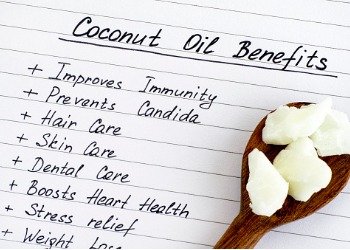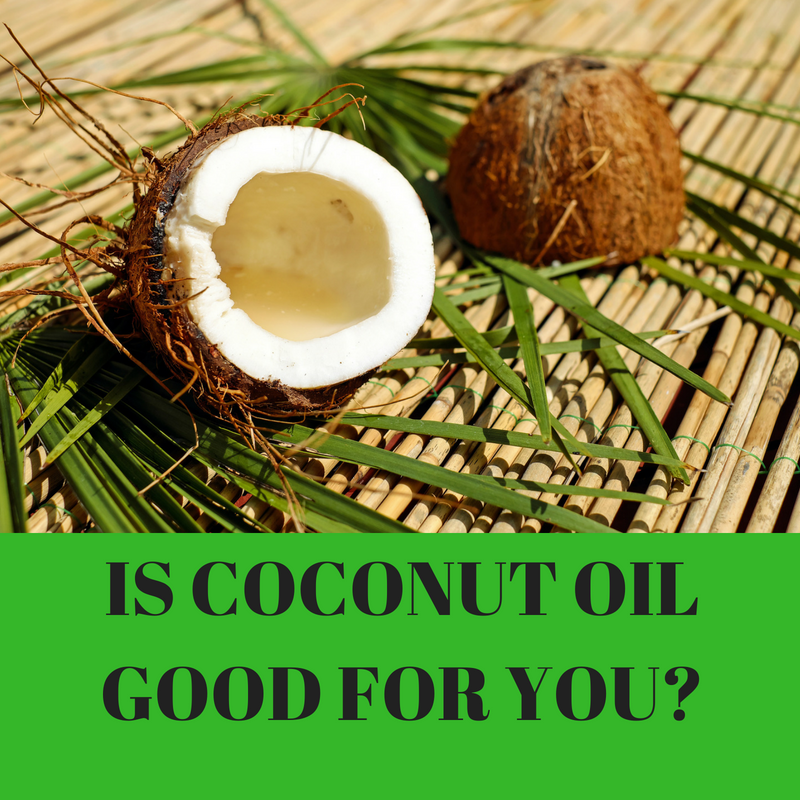The “Real” Truth About Coconut Oil
 You may have seen this in the news about coconut oil. Dr. Karin Michels, a professor at the Harvard T.H. Chan School of Public Health and Director of the Institute for Prevention and Tumour Epidemiology at the University of Freiburg in Germany, went on record to label coconut oil “one of the worst things you can eat.”
You may have seen this in the news about coconut oil. Dr. Karin Michels, a professor at the Harvard T.H. Chan School of Public Health and Director of the Institute for Prevention and Tumour Epidemiology at the University of Freiburg in Germany, went on record to label coconut oil “one of the worst things you can eat.”
Her YouTube video has been seen almost a million times and her speech is entitled “Coconut oil and other nutritional errors,”. She claims that coconut oil is just as bad for your health and well-being as “pure poison.”
Why she made these claims is somewhat obvious and probably based on what the mainstream medical establishment and unfortunately, most people, still believe are the damaging effects of saturated fats and LDL on our health.
Let’s discuss this further. Eighty percent of coconut oil is made up of saturated fat. This is more saturated fat than butter, beef or even pork lard.
Coconut oil consumption did increase levels of low-density lipoprotein (LDL) cholesterol, also known as “bad” cholesterol, in seven out of seven controlled trials. Since higher levels of LDL are automatically assumed to increase our risk of cardiovascular disease, the American Heart Association (AHA) has advised against the consumption of coconut oil. Other organizations such as the British Nutrition Foundation have also issued statements to the effect that while coconut oil can be consumed safely, it should only be included in small amounts and as part of a healthy balanced diet.
Is Dr. Michel correct?
She is not! What Dr. Michel may not understand is the following information.
We have to give credit to this information to Ty Bollinger and the Truth About Cancer Team for the following information:
“Is “High Cholesterol” the Cause of Heart Disease?
Ask any American what causes heart disease, and 99% of the time the answer will be “high cholesterol.” You see, the fact is that cholesterol has been vilified and is now regarded as a “terrifying” substance that must be lowered at all costs. However, if you speak with gerontologists that specialize in elderly medicine, you will quickly find that almost all of the most elderly patients have “high” cholesterol levels (according to the supposedly “normal” standards). But these patients are still alive and many of them are in very good health and are very active for their age.
And just to be clear, cholesterol itself, whether being transported by low-density lipoproteins (LDL) or high-density lipoproteins (HDL), is exactly the same. Cholesterol is simply a necessary ingredient that is required to be regularly delivered around the body for the efficient healthy development, maintenance, and functioning of our cells. The difference is in the “transporters” (HDL and LDL). The fact is that both HDL and LDL are essential for the human body’s delivery logistics to work effectively.
“But haven’t high levels of LDL been associated with increased risk of heart disease?”
“Shouldn’t we try to lower our LDL levels?”
Lower LDL Cholesterol is Not Associated with Reduced Risk of Heart Disease or Death
The Minnesota coronary experiment – conducted between 1968 to 1973 – was a double blind, randomized, controlled human clinical trial designed to test whether replacing saturated fat with vegetable oils lowers risk of coronary heart disease and death, by lowering blood cholesterol levels.
Much to everyone’s surprise, a recently published analysis of previously unpublished data from this study showed that replacing saturated fat with vegetable oils did not lower risk of dying – even though both LDL and total cholesterol levels decreased.3,4
In fact, instead of LDL levels, a high ratio of total cholesterol to high-density lipoprotein (HDL) seems to be the best predictor of cardiovascular risk and insulin resistance.
And in people older than 60 years, a recent systematic review has conclusively shown that LDL cholesterol is not linked to a greater risk of developing cardiovascular disease; instead, it shows an inverse or opposite correlation with death from all causes!5
There is No Link Between Saturated Fat Consumption and Heart Disease Risk
Here’s another shocking fact – a systematic review and meta-analysis of up to 12 studies, published in 2015, showed no connection between saturated fat consumption and either greater risk for heart disease, death from any cause including heart disease, stroke, or type 2 diabetes in healthy adults.6
Systematic reviews use systematic methods to collect and critically assess scientific evidence. They are designed to provide a complete, exhaustive summary of current evidence relevant to a research question.
A meta-analysis is used to combine results from multiple studies to increase or “power up” the statistical likelihood of the results, improve estimates of the size of the effect and sometimes resolve uncertainties when individual studies disagree.
The Sugar Link to Heart Disease
Over 600,000 people die of heart disease in the United States every year, which accounts for 25% of the total deaths. Aside from “iatrogenic” causes (i.e. caused by a doctor or medical treatment), heart disease is the leading cause of death for both men and women.
In 1770, when sugar was only for the wealthy, the average American ate just 4 pounds of sugar a year. In 2018, the average American consumes over 160 pounds of sugar each and every year! Sugar has been linked to cancer, diabetes, and obesity. But is there a link between sugar and heart disease too?
 A diet high in sugar increases your risk of dying of heart disease (even if you aren’t overweight), according to a major study published in JAMA Internal Medicine.7
A diet high in sugar increases your risk of dying of heart disease (even if you aren’t overweight), according to a major study published in JAMA Internal Medicine.7
Over the course of the 15-year study on sugar’s contribution to heart disease, participants who took in 25% or more of their daily calories as sugar were more than twice as likely to die from heart disease as those whose diets included less than 10% added sugar.
Consuming too much added sugar can raise blood pressure and increase chronic inflammation, both of which are pathological pathways to heart disease. A high-sugar diet may also stimulate the liver to dump more harmful fats into the bloodstream, which also can increase the risk of heart disease.
Bottom line…. Stay away from processed sugar. According to brain scans, it’s as addictive as cocaine and can fuel cancer cells, as well as being implicated in heart disease.
There is Also a Link Between Synthetic Trans-Fat Consumption and Heart Disease Risk
Interestingly, the same 2015 systematic review and meta-analysis showed an association between consumption of synthetic trans-fats and risk of heart disease and death from all causes, including due to heart disease.
Interesting, because as I had pointed out in an earlier article, in the 1960s food manufacturers wanted consumers to buy margarine and hydrogenated oil over the natural products people used in their homes to prepare their food. As part of their underhanded marketing campaign, these manufacturers claimed that olive oil, coconut oil, and lard were responsible for clogging arteries and raising cholesterol levels, because of their saturated fat content.8
Here’s a thought – is Dr. Michels’ recent verbal assault the latest chapter in the ongoing defamation of coconut oil? Does she have an agenda we’re not aware of?
While we ponder that intriguing possibility, it’s worth pointing out again how food manufacturers managed to discredit coconut oil, which has been used by millions of people from many civilizations throughout history – and who, by the way, didn’t experience the rate of staggeringly high rates of disease that people in the U.S. currently do. For instance, inhabitants of various islands in the South Pacific have a diet rich in coconut and coconut-derived products – and yet, heart disease is almost non-existent.
Back to the food manufacturers. In a neat trick, they used partially hydrogenated coconut oil for most of their studies. Neat, because partial hydrogenation is the exact same process used to convert natural, healthy unsaturated fats into synthetic, unhealthy trans fats!
In other words, once coconut oil is partially hydrogenated, it is for all intents and purposes a trans-fat version of coconut oil.
Natural, organic coconut oil was not the culprit. Trans-coconut oil was. What a surprise.
 Further, coconut oil is a rich source of medium-chain fatty acids, which are metabolized within our body to ketone bodies – these have been shown to help reduce appetite and maintain the thyroid gland’s optimal control of metabolism, leading to weight loss and better health.
Further, coconut oil is a rich source of medium-chain fatty acids, which are metabolized within our body to ketone bodies – these have been shown to help reduce appetite and maintain the thyroid gland’s optimal control of metabolism, leading to weight loss and better health.
Ketones are also an excellent mitochondrial fuel, and they are able to pass the blood-brain barrier to supply your brain with energy.They are a much more preferable fuel than glucose, as they produce fewer reactive oxygen species and secondary free radicals when burned.
In summary, the available published, peer-reviewed evidence indicates that coconut oil, far from being a poison, is a natural, healthy substance that enhances our wellbeing.
Specifically, raw, organic, virgin coconut oil is rightly considered a superfood because of its ability to boost cardiovascular function, heal damaged cells, and cleanse the body.”
Again, thank you to The Truth About Cancer Team and Ty Bollinger for this research! In Food Integrity Now‘s opinion, coconut oil is an amazing and healthy addition to many people’s diet! Be well!
Sources and references:
- Coconut oil is ‘pure poison’, says Harvard professor
- Coconut oil isn’t healthy. It’s never been healthy.
- Re-evaluation of the traditional diet-heart hypothesis: analysis of recovered data from Minnesota Coronary Experiment (1968-73)
- Editorial: Saturated fat does not clog the arteries: coronary heart disease is a chronic inflammatory condition, the risk of which can be effectively reduced from healthy lifestyle interventions
- Lack of an association or an inverse association between low-density-lipoprotein cholesterol and mortality in the elderly: a systematic review
- Intake of saturated and trans unsaturated fatty acids and risk of all cause mortality, cardiovascular disease, and type 2 diabetes: systematic review and meta-analysis of observational studies
- Added Sugar Intake and Cardiovascular Diseases Mortality Among US Adults
- Coconut Oil Benefits: The Incredible Power of Coconut Oil
Love Food Integrity Now? Help support us by either donating or supporting these products. Thank you!
 Want to try an organic, non-GMO, glyphosate-residue free and heavy metal free turmeric. Here it is and it is the best. Check it out here:
Want to try an organic, non-GMO, glyphosate-residue free and heavy metal free turmeric. Here it is and it is the best. Check it out here:
 My good friend, Matt, created a nut milk bag that is superior to most. Check out the Nutiana Nut Milk bag here:
My good friend, Matt, created a nut milk bag that is superior to most. Check out the Nutiana Nut Milk bag here:

Thank you so much for this excellent article! It is not easy these days to sort out truth from fiction. Knowing the methods that testing is done makes all the difference. I appreciate your “sorting this out” for us.
Thank you for giving us the arguments to defend the yes of coconut oil, that has so many advantages. Maybe that could be highlighted in another article, the capaciteit of killing bugs in the intestin.